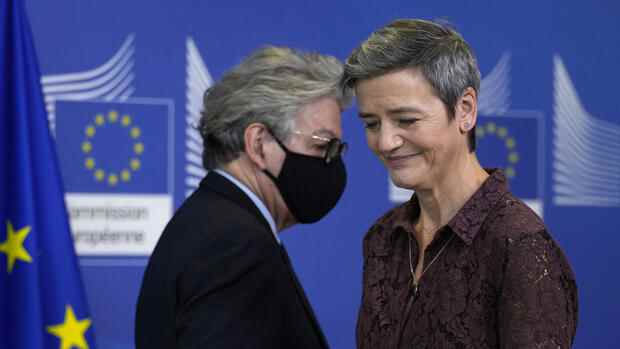The two members of the commission often have to work together.
(Photo: AP)
Brussels This Monday begins a billion-dollar lawsuit for small, rather inconspicuous online ads. The Google group is said to have exploited its market power when marketing its “AdSense” ads and is now resisting paying a fine of 1.49 billion euros. In the EU Commission, Margrethe Vestager has been responsible for such cases for years. With courageous and meticulously conducted investigations against the largest corporations in the world, she has earned an excellent reputation.
In the fight against the machinations of the digital giants, the EU Commission has just had additional powers granted to it. The laws “Digital Markets Act” (DMA) and “Digital Services Act” (DSA) set narrow limits for the corporations. Hundreds of jobs are to be created in the EU Commission to enforce the new rules, financed by the companies. The EU is a pioneer with the laws, other countries want to copy them before they come into force. It is all the more important how they are enforced.
And there is one big open question: It has not yet been decided that Vestager will be responsible for this. Ambitious French commissioner Thierry Breton is also interested in overseeing the new authorities.
Strained relationship between Vestager and Breton
The relationship between Vestager and Breton has long been considered tense. In the negotiations on the digital laws, they did not always manage to coordinate their positions in a meaningful way before negotiating changes with the members of the European Parliament.
Top jobs of the day
Find the best jobs now and
be notified by email.
Whoever is assigned the new tasks could shape European digital policy for a long time to come. And that would make a difference: Vestager is a liberal competition watchdog and is very keen on the state holding back where it is not really needed. Breton is an industrial politician of the French school, who is also happy to spend large sums of tax money for the prospect of establishing European champions on the market.
To enforce the DSA, which is primarily concerned with social media content, Breton estimates 300 employees, half of whom will be hired and the other half contracted externally. According to demands from Parliament, 220 additional employees are to enforce the DMA, which is intended to set limits on the exploitation of market power.
>> Read here: Truth instead of anger: how the EU is now taming the internet
In rank Breton is below Vestager. This suggests that the Dane can supervise the new teams if she requests it. But Breton also has high recognition from Commission President Ursula von der Leyen. This has already relied on the French for some difficult missions, for example when it came to ramping up vaccine production in Europe. It is not known when von der Leyen will choose the winner of the duel.
But there is not much time left to hire the new forces. Both laws are to be applied in the coming year. And then everything has to work. Even if the Commission gets its posts filled by then, it will have to take action against better-resourced companies. Just as Google is now suing in the AdSense case, the tech companies will first have every instruction and every fine from the new authorities legally checked. That is why every notification must be legally correct. The Commission cannot afford inaccuracies.
Vestager’s punishments mostly held up in court
That speaks for Vestager. The trial now beginning is her third Google case. She is also taking action against Amazon, Facebook and Apple. Car cartels, gas suppliers and entire states have received payment requests from Vestager’s people. The sentences she imposed mostly held up in court.
The hope in Brussels is that the future DMA proceedings will not take as long as the previous antitrust proceedings. Because the lengthy test of whether a company has market power is no longer necessary under the new law.
The AdSense case deals in part with business practices from 2006. Google is said to have used exclusivity clauses to prevent its customers from using other marketers at the same time. In 2009, the group relaxed the terms of the contract, and in 2016 it stopped the controversial practice after objections from the commission. It took until 2019 for the commission to pronounce the sentence. The court hearing can also drag on for more than a year.
More: The EU regulates the Internet – and presents the best law that could happen to the digital
